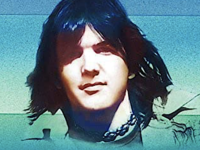NICK DERISO: This anthology — perfectly subtitled, “How the Time Does Fly” — was a great place to sit for spell and ruminate on the distant twangy past. Flying Fish included 18 tracks culled from nine of Hartford’s brilliant, throwback banjo records.
His brand of riverboat bluegrass stayed interesting — and stayed away from sounding pokey — with a thoughtful mix of solo work and band outings. Some of the more ageless stuff here is from Hartford’s best recording, 1976’s “Mark Twang” — which was about as blue as bluegrass gets. (It won him a Grammy in the traditional recording category.)
Hartford went it alone on that one, playing fiddle as well as banjo — and doing all the vocals. And all the dancing. (Yes, those were his feet you heard scuffling on the floor.)
Better, “Mark Twang” was recorded live in the studio — in two takes, one for each side. That lent an immediacy lacking in some of his later, more produced albums.
Something approaching that spunk was found in “Nobody Eats at Linebaugh’s Anymore,” which showed up as a live recording from the 1977 Telluride Festival in Colorado.
Surprisingly, “Gentle on My Mind” — Hartford’s Big Hit — was left mostly to the band on this collection. Glen Campbell not only had a smash with this one, he used it for the opening of his well-known “Goodtime Hour” program. (Hartford’s “Natural to be Gone,” by the way, was played over the TV show’s closing credits.)
Hartford sidestepped convention, though, when it came time to record this signature tune on the album “All in the Name of Love,” also from 1977. Between every verse, he called a succession of folks up to the mike to pick and grin. The list was long and impressive — mandolin, piano, dobro, guitar — because, as he so often does, Hartford had invited a band stuffed with go-to-town talent for the record.
In the end, Hartford provided a nice kick in the pants for a country classic.
Although it seems scarcely possible, these plucky arrangements and grampy sing-song vocals — equal parts melancholy, hoedown and Huck Finn — somehow find a way to make life on the mighty Mississip’ seem like a worthwhile subject once more.
- How Deep Cuts on ‘Music From Big Pink’ Underscore the Band’s Triumph - July 31, 2023
- How ‘Islands’ Signaled the Sad End of the Band’s Five-Man Edition - March 15, 2022
- The Band’s ‘Christmas Must Be Tonight’ Remains an Unjustly Overlooked Holiday Classic - December 25, 2016




